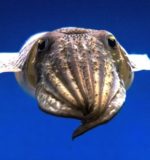Cephalopods such as octopuses and squids may demonstrate some impressive smarts, but the latest research on cuttlefish may just blow your mind.
Researchers have found that cuttlefish fed to a schedule will very quickly cut back on eating less enticing food, so they can gorge themselves on their favourite later on.
This means that not only are cuttlefish seemingly able to memorise the feeding schedule, they’re incorporating that schedule into future planning, and then exercising self-control to make the most of their favourite food (shrimp, yum).
That’s wild.
“It was surprising to see how quickly the cuttlefish adapted their eating behaviour – in only a few days they learned whether there was likely to be shrimp in the evening or not,” said neuroscientist Pauline Billard of the University of Cambridge in the UK and Université de Caen Normandie in France.
“This is a very complex behaviour and is only possible because they have a sophisticated brain.”
The experiment was conducted on 29 European common cuttlefish (Sepia officinalis). These little guys were put in tanks, and tested to see what their favourite food was.
They were given crab and shrimp at the same time, five times a day for five days; whichever food item they went for first was interpreted as the favourite. All 29 cuttlefish were all about that shrimp.
For the experiment, the cuttlefish were fed daily. All cuttlefish got a crab in the morning. One group was then also given a shrimp every evening. The other group was randomly given a shrimp or not, which was decided using a random number generator.
The first group quickly adapted. They seemed to know that a shrimp (best food) was coming every night; they ate less and less of the crab over the 16-trial experimental period, and went nuts on the shrimp.
As for the second group, the random provision of shrimp could not be counted on; these cuttlefish ate more or less the same amount of crab for the duration of the experimental period. Overall, there was a significant difference in crab consumption between the two groups.
Then, the groups were swapped. And the same thing happened: The cuttlefish that were reliably fed shrimp adapted and ate less crab; the cuttlefish that received shrimp randomly ate significantly more crab.
It’s not dissimilar to experiments on vertebrate animals (and small children), where they are tested on self-control. It’s called the marshmallow test, and subjects are thought to have successfully demonstrated self control if they refrain from eating a treat when they know there will be a better one later.
Crows and ravens – those wickedly intelligent eldritch birds – have shown this ability, as have some primates, and dogs, albeit variably.
But cephalopods are different. They’re not just invertebrates; their evolutionary path on this planet is different from pretty much every other organism. So, too, is their intelligence – leading to the (uh, out-there) hypothesis that octopuses are, actually, from another planet.
So seeing cognitive capacities that have been demonstrated in vertebrates also demonstrated by these little tentacle-faced squishy weirdos is pretty danged cool. And not just for its own sake. We can learn more about the evolution of complex cognition.
There’s just a little bit more work to do first. It’s not quite completely validated that the cuttlefish’s self-control-like behaviour is underpinned by an ability to plan for the future, or the desire to eat shrimp in the present moment. That will need to be investigated in future studies.
“Nevertheless, these results represent a promising way for further studies on flexibility and future-oriented behaviour in cephalopods,” the researchers wrote in their paper.
“Given that cephalopods diverged from the vertebrate lineage approximately 550 million years ago, finding comparable future-oriented abilities in cuttlefish might provide valuable evolutionary insight into the origins of such a complex cognitive ability.”
After this study, all the cuttlefish were kept in their respective labs. They participated in a few more non-invasive studies, and lived out their natural lifespans in comfortable cuttlefish habitats.








 Photographer Finds Locations Of 1960s Postcards To See How They Look Today, And The Difference Is Unbelievable
Photographer Finds Locations Of 1960s Postcards To See How They Look Today, And The Difference Is Unbelievable  Hij zet 3 IKEA kastjes tegen elkaar aan en maakt dit voor zijn vrouw…Wat een gaaf resultaat!!
Hij zet 3 IKEA kastjes tegen elkaar aan en maakt dit voor zijn vrouw…Wat een gaaf resultaat!!  Scientists Discover 512-Year-Old Shark, Which Would Be The Oldest Living Vertebrate On The Planet
Scientists Discover 512-Year-Old Shark, Which Would Be The Oldest Living Vertebrate On The Planet  Hus til salg er kun 22 kvadratmeter – men vent til du ser det indvendigt
Hus til salg er kun 22 kvadratmeter – men vent til du ser det indvendigt  Superknepet – så blir snuskiga ugnsformen som ny igen!
Superknepet – så blir snuskiga ugnsformen som ny igen!  Meteorite That Recently Fell in Somalia Turns Out to Contain Two Minerals Never Before Seen on Earth
Meteorite That Recently Fell in Somalia Turns Out to Contain Two Minerals Never Before Seen on Earth  Nearly Frozen Waves Captured On Camera By Nantucket Photographer
Nearly Frozen Waves Captured On Camera By Nantucket Photographer  It’s Official: Astronomers Have Discovered another Earth
It’s Official: Astronomers Have Discovered another Earth 